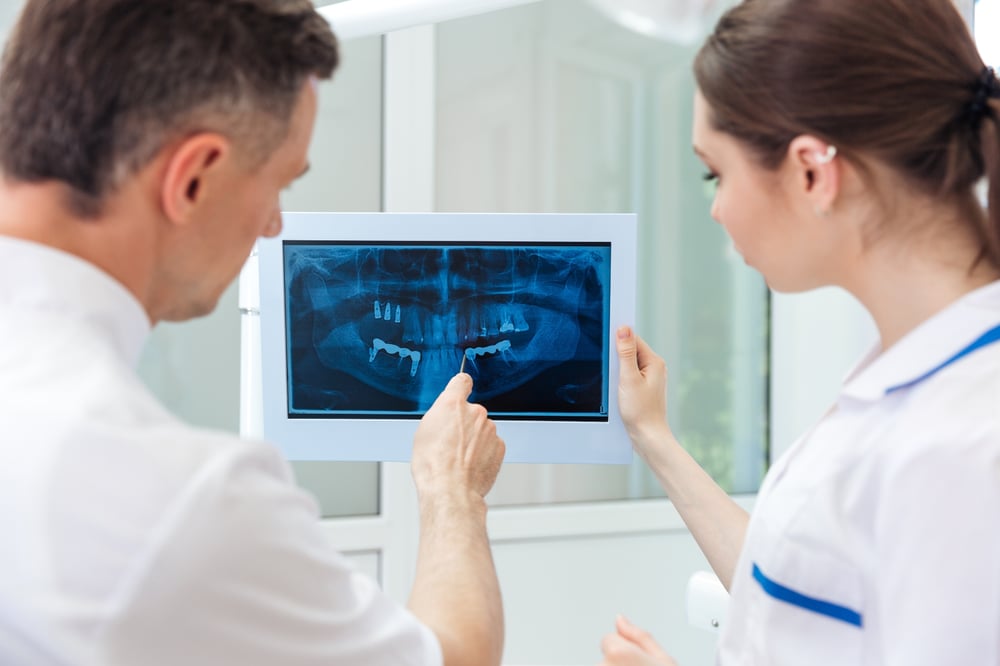Posted by Amy Carbone on Jan 22, 2020 9:00:00 AM
Mentorship in dental school can greatly contribute to your future success. Learn more about how to find and work with a great mentor with these tips.
Why Having a Mentor is Important in Dental School
Having a mentor can be a great way to develop leadership skills, competitive techniques, and other important qualities of a successful dental professional. Both the mentor and mentee stand to gain significantly from a quality relationship.

A mentorship helps dental students:
- Learn how to accept feedback or constructive criticism.
- Develop important networking contacts that can help students grow their careers.
- Discover strengths and learn how to overcome professional weaknesses.
- Receive guidance on professional development in the dental industry.
- Develop the interpersonal skills needed for future dentist-patient relationships.
A mentorship helps mentors:
- Feel like they're passing their knowledge on to the next generation of dental professionals.
- Improve relationships with colleagues and superiors.
- Build a reputation as a specialist or leader in a particular field of dentistry.
Can You Have More Than One Mentor?
Dental students don't have to limit themselves to a single mentor, although it may be difficult to manage two or three mentorships along with the challenges of dental school. If you choose to have a second mentor, make sure you're giving equal time to both relationships.
How to Find a Mentor
You should be working with a mentor who practices in the area of dentistry you have the most interest in. Finding one, however, can sometimes prove to be a bit of a challenge.

Where to Look
At its core, a mentorship is a relationship. Start with people you already have positive relationships with, such as your pediatric dentist or a professor from school. Approach them and ask if they'd be willing to mentor you through dental school and potentially even beyond as a dental associate after graduation.
Many local dental societies will have mentorship programs available that help to match dental students with recommended mentors. The benefit of finding a mentor this way is you can be confident the mentor is on board and motivated to provide you with guidance. However, a caveat is that you'll have to build a relationship with your mentor from scratch.
What to Look For
When searching for potential mentors, look for dental professionals who:
- Genuinely have your interests in mind (this is where having an existing relationship can help).
- Put a high value on learning
- Provide constructive criticism with actionable advice
- Is considered a leader in their area of dentistry
- Will push you outside of your comfort zone
Working with Your Mentor
When working with your mentor as a dental student, communication is of the utmost importance. How you communicate can have an impact on the mentor-student relationship and what you get out of the mentorship.

Communicate In Person
Whenever possible, communicate with your mentor in person. This is especially true when first meeting with your mentor and establishing the relationship. If you don't have an existing relationship with your chosen mentor, meeting in person can allow your mentor to connect your face with your name and credentials.
Communicating via Email
Busy dentists might not have a lot of time to sit down and read long email messages. Keep emails short and limited to quick questions, thank you’s, and follow-ups. Avoid writing long-winded emails about your dental career goals or dental specialty program aspirations, especially if you do end up pitching to a potential mentor via electronic communication.
Social Media Communication
Although social media is more pervasive now than ever, it's likely the least professional form of communication available. While you should certainly engage with your mentor on social if they have an account and are active, it should not be your primary means of reaching out.
Building Your Relationship with a Mentor
Finding a mentor is only part of the challenge. The real work often comes with the day-to-day management of a mentor-student relationship. Reach out to your mentor often, especially when either of you makes notable accomplishments or participates in activities. Plan to attend continuing education events or community functions together, or even just grab a drink after work once a month. Make an effort to connect with your mentor personally and professionally.
Interested in Having a Mentor During Dental School? Avoid This Critical Mistake
If you're working on obtaining a mentor while you attend dental school, it's important to understand that you don't have to continue building a relationship with a mentor you don't see eye-to-eye with. Perhaps your mentor is busier than they anticipated and are slow to answer your questions or don't have time to meet with you. Or, perhaps there's a personality clash and you find it difficult to work with and feel supported by a mentor who isn't able to provide constructive feedback.
Don't make the mistake of "sticking it out" with a mentor who isn't providing you with a rich mentorship experience. It's perfectly acceptable to politely and professionally end the relationship and seek out a new mentor with whom you may have a better connection. A mentorship should be a valuable and enriching experience. When yours isn’t, it’s time to find one that is.
About Treloar & Heisel
Treloar & Heisel is a premier financial services provider to dental and medical professionals across the country. We assist thousands of clients from residency to practice and through retirement with a comprehensive suite of financial services, custom-tailored advice, and a strong national network focused on delivering the highest level of service.
Treloar & Heisel and Treloar & Heisel Property and Casualty are divisions of Treloar & Heisel, LLC.
Insurance products offered through Treloar & Heisel, LLC.
Treloar & Heisel, LLC. and its divisions do not offer career consulting advice. Please consult a professional concerning this topic.


